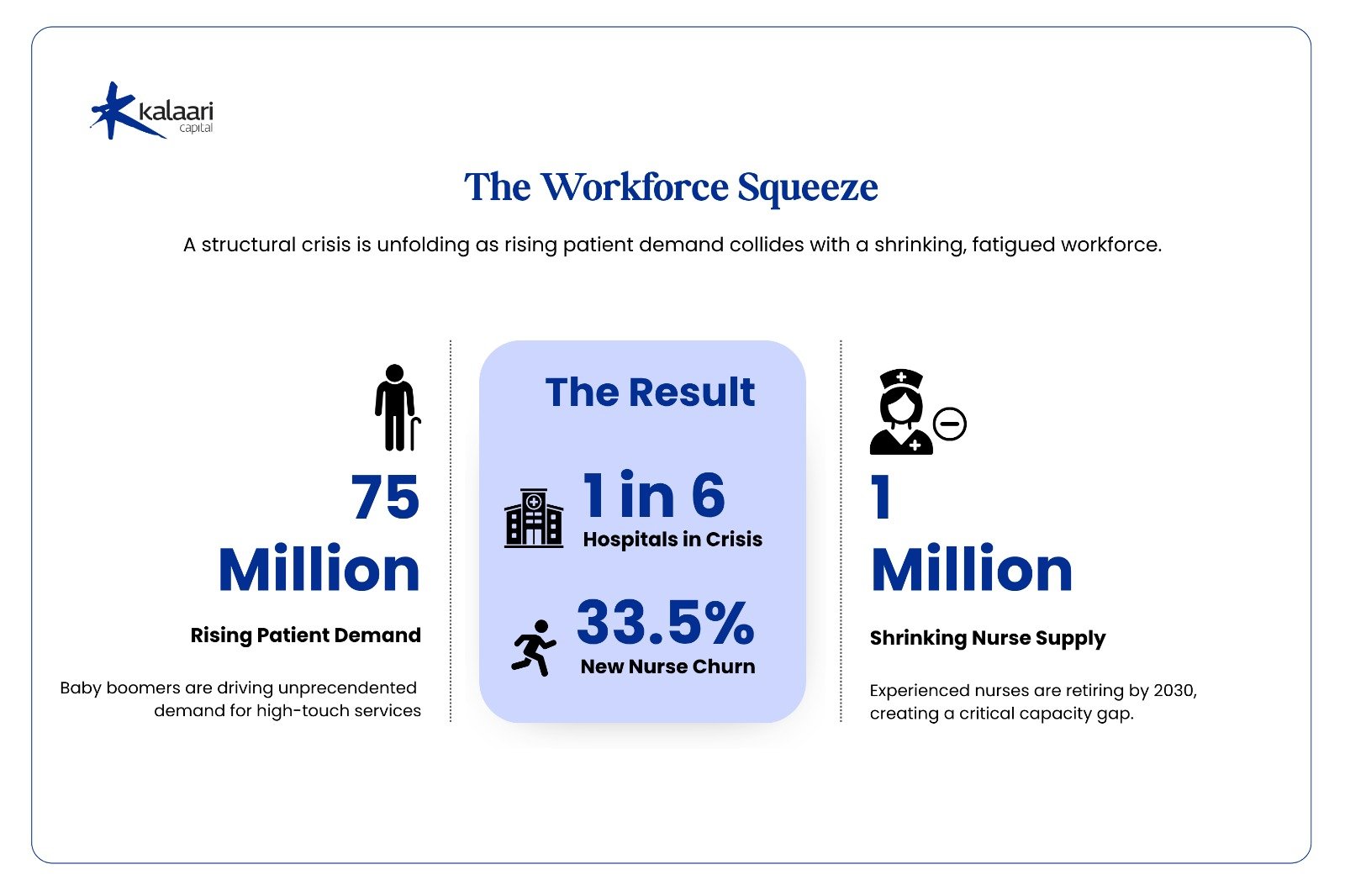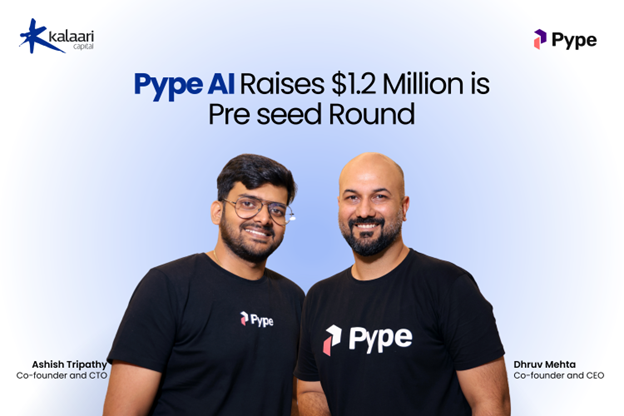Over the past decade, Healthcare has undergone a dramatic digital transformation.
- In 2015, 72% of U.S. hospitals had basic EHRs. Today, it’s 96%; almost every clinical encounter now leaves a digital footprint.
- Virtual Outpatient visits have gone from 1% to 20%. For mental health specifically, over 50% of outpatient visits are virtual.
- Patients that accessed medical records online and used portals, apps or SMS for scheduling, results and communication; have gone from 30% to over 70%.
- From just 12% of health systems using AI; today, more than half rely on AI for diagnostics, triaging, imaging, or workflow automation.
- Volume of claim settlements, authorizations and scheduling went from less than 10% to over 40%.
- Clinical workforce using mobile/cloud-based tools have gone from under 20% to over 80%, across workflows.
- In 2015, the Healthcare ecosystem produced 153 Exabytes of data. In 2024, this number had crossed 2300 Exabytes, as one of the world’s biggest data engines.
Despite this tremendous digital progress, most healthcare facilities continue to be overloaded. Studies show that for every hour physicians spend face-to-face with patients, they spend nearly two additional hours on EHR documentation and desk work. One-third of patient calls typically go unanswered; with missed appointments costing hospitals an estimated $150B each year. Readmission rates continue to be high, with over 3.8M patients getting readmitted within 30 days in 2024.
This gap reflects a simple truth: digitization alone has not translated into scalable, reliable coordination. What further intensifies the digital overload today more than ever is the structural rise in patient demand and declining supply of medical nurses.

Today, medical staff cannot keep up with the volume of outreach, reminders, and rescheduling tasks required to maintain seamless continuity of care. We feel that the next wave of improvement will not come from new clinical breakthroughs, but from rethinking the workflows, automation, and intelligence that connect every step of a patient’s experience.
This is where Pype AI comes in.
Pype AI – The Frontdesk for Hospitals and Clinics
Pype AI is an agentic platform purpose-built to address healthcare coordination bottlenecks. It is developing autonomous, voice-led agents that manage a provider’s front-desk and patient communication workflows end-to-end: answering calls, handling scheduling, sending reminders, conducting follow-ups, and capturing updates directly into the clinical workflow.
What distinguishes Pype AI is its infrastructure-first approach. Instead of building a surface-level voice interface, they are deeply integrating with EMRs and telephony systems (like Epic, Cerner, and Zocdoc). Every interaction is captured end-to-end: the call itself, the variables pulled from the EHR, the disposition, the summary, and any transfer or escalation; allowing Hospitals to see exactly how an agent behaves and shapes downstream workflows.
Alongside deep integration, the platform offers turn-level eval and debugging tools that go far beyond transcripts. Each call can be inspected at the level of individual turns, with session traces, timeline views, grounding checks, and guardrails mapped to the relevant clinical workflow. This makes the system auditable in a way clinical environments require.
A core element is Pype AI’s in-call reporting loop, which allows clinicians and operations teams to flag issues in the middle of a call. The agent logs the precise turn, records the issue, continues the conversation naturally, and feeds that information straight into the QA pipeline. Over time, this creates a continuous annotation stream drawn from real hospital usage; generic agent platforms simply don’t capture.
Pype AI has also developed Whispey, an open-source observability and quality layer designed for clinical environments. It offers 40+ evaluations for compliance, accuracy, and safety, along with an in-call correction system that allows clinicians to provide direct feedback during live interactions. These inputs fold back into the system, enabling continuous refinement grounded in the frontline context.

The founding team
Pype AI came to life through the vision of Dhruv and Ashish. We had the fortune of knowing them long before they materialized their plan. At the time, they were exploring early agentic prototypes, and how these could be implemented across different industries/use-cases to automate high-volume, time-sensitive workflows.
Dhruv (Co-founder & CEO) spent a large portion of his career at Meta as a Technical Principal, where he worked on applications that were used by over 100M+ daily users. That experience shaped how he thinks about automation, feedback loops, and designing products that can adapt without constant human supervision. After Meta, he also spent a long time experimenting with early concepts and working with multiple startups on how to build better AI systems.
Ashish, (Co-founder & CTO) is a Data scientist who has had stints across SAP and LinkedIn. His experience has been closer to the infrastructure layer, spanning natural language systems, data pipelines, and automation frameworks, essential ingredients for dependable agentic systems. Much of his work involved turning unstructured signals into structured decisions that software could act on.
The Way Ahead
Today, Pype AI is already deployed across multiple healthcare facilities. Across these pilots, they have managed to handle 85%+ of all patient queries autonomously, reduce administrative hours by 40%, reduce no-shows by 60% and maintain natural conversation quality with sub-second response latency
Now, with a growing team of engineers, researchers, and physician advisors across India and the US, Pype AI plans to scale its presence to over 50+ hospitals and clinic chains by mid-2026. The company is also collaborating with medical experts to publish research quantifying AI’s impact on treatment adherence and readmission rates.
At Kalaari, we are super excited to partner with Pype AI as they pioneer agentic automation for Healthcare globally. We’re glad to be leading their pre-seed round, with participation from Wyser Capital and Tenity.
Dhruv Mehra, Co-founder & CEO, Pype AI on partnership with Kalaari “We built a relationship with Kalaari long before they invested. The team has an operator’s mindset; they got into the weeds, gave honest feedback, and believed we could crack healthcare as outsiders.
What stood out was how they engaged us. They felt more like thought partners helping us work through problems, not just investors. They moved fast and backed us even though we were early. That alignment made the choice clear.”
Jayraj Bharat Patel, AVP, Kalaari Capital “Healthcare has long suffered from deep operational inefficiencies and we believe Pype AI’s domain-specific agents will play a pivotal role in helping medical institutions become more efficient. Dhruv and Ashish are both highly experienced; and bring immense passion to building better AI systems. We are super excited to partner with them on this journey”
Kalaari Capital is an early-stage, technology-focused venture capital firm based out of Bengaluru, India. Since 2006, Kalaari has empowered visionary entrepreneurs building unique solutions that reshape the way Indians live, work, consume and transact. The firm’s ethos is to partner early with founders and work with them to navigate the inevitable challenges of fostering ideas into successful businesses. At its core, Kalaari believes in building long-term relationships based on trust, transparency, authenticity, and respect.
If you are a founder building an early-stage company, write to us at pitch@kalaari.com








